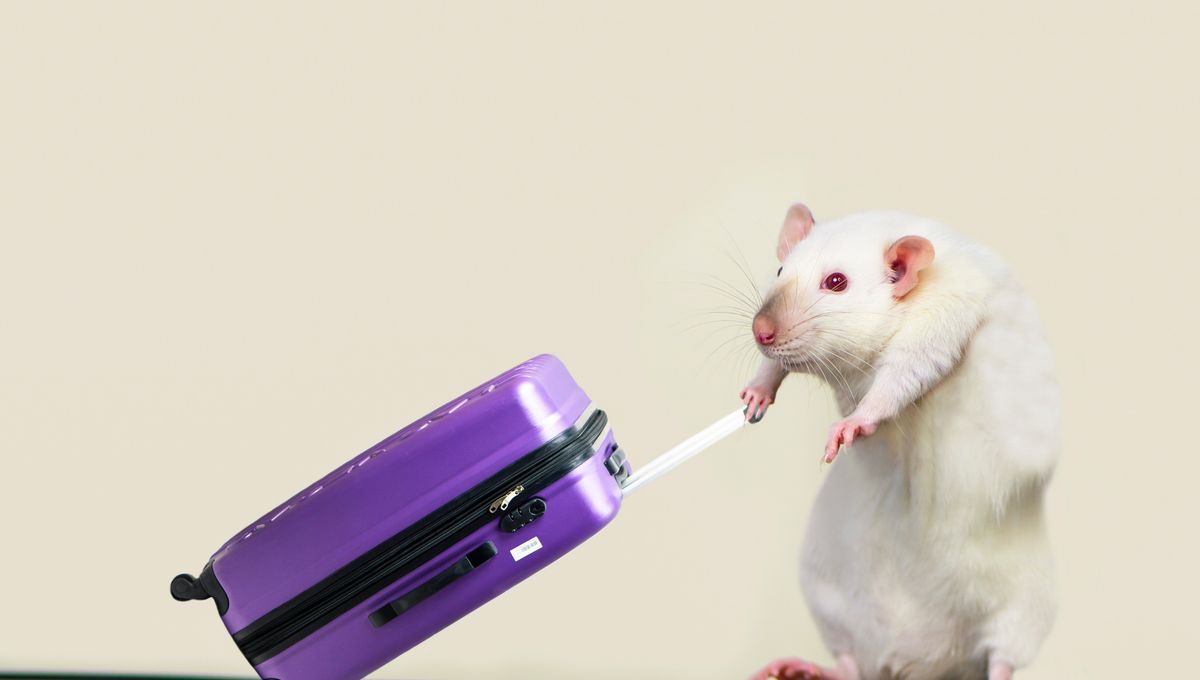
This is the story of a stowaway rat, who hopped on a transatlantic flight, caused mass panic, had its travel plans rudely interrupted by a one-way trip to a scientific facility, and is now teaching the world a whole lot about global disease transmission. Sit back, relax, and let us tell you a tale.
In 2017, a rat boarded a flight from Miami to Berlin. We can speculate that the little guy had plans to avail itself of the onboard facilities, kick back with an inflight movie, and gorge itself on peanuts. Unfortunately, its vacation plans were interrupted by the hordes of frightened passengers demanding – understandably – to know why there was a rat on the plane.
Rather than a relaxing long weekend enjoying art exhibitions or taking in the historic sites of the German capital, what actually followed was the thrilling chase and eventual capture of the accidental tourist by a sniffer dog, after which it was summarily handed over to scientists at the Friedrich-Loeffler-Institut.
An inauspicious end to a city break, to be sure; but for the scientists, this was a great opportunity.
“Rats are true globetrotters,” said Professor Rainer Ulrich, author of the new study, in a statement. “Wherever people travel or transport goods, rats can follow – and bring their microbes with them.”
In this case, we can’t be sure the rat’s vacation did begin in Miami – it may have already been on the plane when it departed from its prior location of Dubai, adding a whole extra continent to its wanderings.
To find out whether it had carried any microbes in its luggage, the rat was dissected and subjected to what the scientists call an “all tools on deck”, highly comprehensive screening process.
Rats have been infamous throughout much of human history for the diseases they can spread. The first example that comes to mind is probably plague – although that’s not technically the fault of the rats and rather the fleas they can carry. But rats can be direct vectors of a number of potentially deadly infections, including leptospirosis (Weil’s disease), hantavirus, and tularemia.
Thankfully, our rat adventurer was not carrying any of the really worrying pathogens, meaning that the passengers and crew on the flight were likely not at significant risk of infection.
However: “The surprising part was not what we didn’t find, but what we did find: a Staphylococcus aureus strain that is nearly identical to human variants. This shows that rats can pick up pathogens from us and potentially pass them back,” said Professor Ulrich.
As well as that, there were numerous other fungi and bacteria. Most were harmless strains that naturally colonize the intestines, but there were also opportunistic pathogens, including Enterobacter cloacae and Klebsiella aerogenes.
Lessons from our past show us the dangers that can come from animals hitching a ride on ships or in cargo, transporting zoonotic diseases halfway across the world. Today, with the speed of air travel, this rat’s travel journal illustrates how this risk is more acute than ever.
“Our findings demonstrate that rats are not just urban pests. They should be regarded as active players in the global network of pathogen spread,” said Professor Ulrich.
The authors suggest that this study should serve as a blueprint for future scenarios, with immediate capture of stowaways and comprehensive pathogen screening being key priorities. “This was a wake-up call,” Professor Ulrich added.
So, while this rat may have missed out on getting a selfie at the Brandenburg Gate, at least its jaunt across the Atlantic was not in vain.
The study is published in the journal Scientific Reports.
Source Link: Stowaway Rat That Hopped On A Flight From Miami Was A “Wake-Up Call” For Global Health